With the advent of television and the widespread adoption of primaries, the national parties' nominating conventions have largely been reduced from decision-making bodies to a rubber stamp function. The conventions are, in fact, tightly scripted made-for-TV spectacles. These quadrennial gatherings fulfill a vital function in the life of the political parties and can provide a boost for the nominee, but much was lost in the COVID-reconfigured 2020 conventions.
| Republicans |
Democrats |
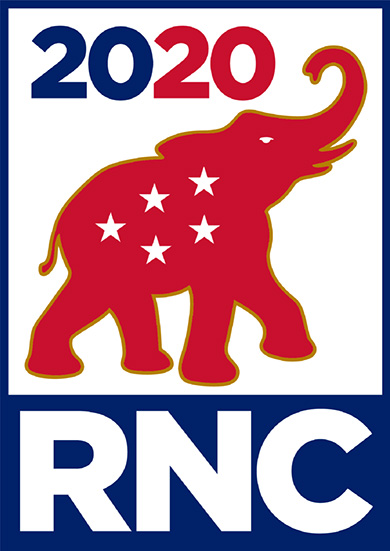 Aug. 24, 2020 Business Meeting Charlotte, NC Aug. 24- 27, 2020 Washington, DC |
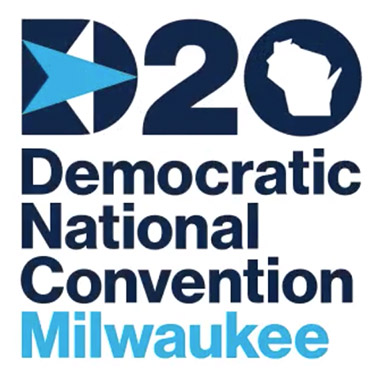 July 13-16, 2020 > Aug. 17-20, 2020 Milwaukee, WI virtual/Wilmington, DE |
Conventions in a Time of COVID-19
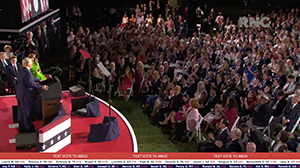
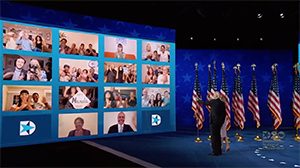
In the year of COVID-19, the major party conventions took a
much, much different form than in past. The pandemic
posed unique challenges to the respective planning teams,
and the events they came up with were dramatically
different.
Democrats went first and opted for a largely
virtual event, arguing that public health considerations
were paramount. The result was a reasonable facsimile
that inevitably fell short of "the real deal"—the in-person
convention experience—in many respects. Instead of an
arena filled with the boisterous energy of delegates
cheering, waving signs, and chanting, many speeches were
delivered in near empty halls; a video wall provided 16 to
30 frames of people cheering. Instead of journalists
from around the world, network skyboxes, and photographers
roaming the convention floor, a limited number of reporters
covered major events. Democrats did seek to engage
constituency groups in virtual meetings and watch
parties. Instead of parties and receptions in
restaurants around town there were virtual events.
Republicans took a very different
approach. While many of the speeches were delivered in
the empty Andrew W. Mellon Auditorium in Washington, Vice
President Pence spoke in front of an audience at Fort
McHenry, and on the final evening, there was a "pull all
stops" spectacle on the South Lawn of the White House.
Critics questioned the legality of the event, the blurring
of the lines between campaigning and governing, and the
flaunting of the CDC's social distancing guidelines, but the
imagery was stunning. In front of an audience of about
1,500 people, Trump spoke for about 70 minutes followed by
fireworks at the Washington Monument and a performance by
tenor Christopher Macchio.
For both teams of planners there were hopes that the pandemic would subside and there were many twists and turns on the road to convention week. Democrats moved the dates of their convention from July 13-16, 2020 to the week of Aug. 17 and also said they were exploring all options to avoiding risks to public health, from "adjusting the convention’s format to crowd size and schedule (1, 2)." On June 24 Convention planners announced a "Convention Across America" plan, stating that "host city Milwaukee would anchor the events for the week, and that programming would include both live broadcasts and curated content from Milwaukee and other satellite cities, locations and landmarks across the country." Under the plan "state delegations should not plan to travel to Milwaukee and should plan to conduct their official convention business remotely." On Aug. 5 the DNCC announced that convention speakers including Vice President Biden would not travel to Milwaukee, completing the transition to a virtual convention.
Republicans, led by President Trump, vowed to
proceed with an full in-person event. On July 20, 2018
the RNC had announced Charlotte, NC as the site of its 2020
national convention. In late May 2020 Trump raised
doubts about Charlotte, and on June 2, with less than three
months to go until the gathering, he announced he was moving
the convention to a city to be determined because North
Carolina officials would not guarantee the convention venue
could to be fully occupied (+).
On
June
11
the
RNC
announced
business
meetings
would
take place in Charlotte, while the celebration of Trump's
re-nomination and acceptance speech would occur in
Jacksonville, FL. However in the succeeding weeks
COVID-19 cases spiked in Florida, and on July 23 Trump
announced he would not go ahead with the Jacksonville
events. Trump weighed the idea of delivering his
acceptance speech at Gettysburg, PA or at the White House,
before settling on the White House.
Leading up to the national conventions, many delegate selection gatherings and state party conventions were reduced to virtual events. In addition the three major third parties held virtual conventions, the Constitution Party telephonically, the Libertarian Party via Zoom Webinar with an in-person component in July, and the Green Party via Zoom.
The Role and Changing Character of Conventions
The national nominating conventions have
evolved over the decades and are now largely reduced to
rubber stamps, but they still fulfill a vital function in
the life of the political parties. While the televised
view of a convention is dominated by scenes of delegates on
the convention floor and speakers on the stage, in many
ways, the essence of a convention is what happens off of the
convention floor. In the lead-up to the convention,
the drafting of the party platform provides interests
aligned with the party a forum to present their
concerns. During the days of the convention itself,
hundreds of events, caucuses, receptions, breakfasts,
fundraisers, and parties take place in the hotels
surrounding the convention hall. At the end of the
convention, party activists energized by their convention
experience return to their communities focused on the fall
campaign and, if all goes well, the presidential ticket
emerges with a "convention bounce."
In the past, the national convention served
as a decision-making body, actually determining the party's
nominee. For example, the 1924 Democratic National
Convention in New York lasted 17 days and required 103
ballots to select John Davis as the nominee. The last
Democratic Convention to go beyond one ballot occurred in
1952, when Adlai Stevenson won on the third ballot; the 1948
Republican Convention went to a third ballot before New York
Governor Thomas E. Dewey won the nomination.
Republicans had a close vote in 1976 in Kansas City when
President Ford prevailed over Ronald Reagan by 1,187 votes
to 1,070 votes.
In 2016 the unorthodox candidacy of Donald
Trump generated a significant number of disaffected
Republicans (#NeverTrump) and it appeared quite possible
that no candidate would achieve the 1,237 delegates needed
to win the party's nomination. In March and April 2016
there was a lot of talk about the prospect of a contested
convention in Cleveland, but
it ended rather quickly following Trump's win in the May 3
Indiana primary and his assumption of the mantle of
presumptive nominee.
Again in 2019 and early 2020 there was talk that the Democratic nomination might be decided at the convention. Observers postulated that none of the candidates was strong enough to secure a majority of the delegates in the primaries (>), and that some of the candidates with less support would stay in the race and possibly play a power broker role at the convention. However, experience suggested that this speculation would prove baseless and that things would likely fall into place for one or another of the candidates. That is what happened as former Vice President Joe Biden won most of the primaries on Super Tuesday, mini-Super Tuesday and March 17.
Two significant changes have occurred in recent
decades. First, most of the national convention
delegates are now selected by voters in primary contests
rather than by party caucuses and meetings. Second,
with the advent of television, conventions have become
tightly scripted made-for-TV spectacles. Each party
seeks to present itself in the best possible light and to
demonstrate a united front rather than to hash out its
differences.
One could argue that modern day conventions are little more than four-day advertisements for the political parties. Because there is no longer much suspense, conventions have suffered declining viewership, coverage by the major networks has been cut, and some observers have suggested that the conventions themselves should be cut to three days. The pandemic forced convention organizers to consider a wide range of options and make multiple adjustments to their plans; those experiences may lead to changes in future conventions.
Both parties conduct lengthy site selection
processes to determine which cities will host their
conventions.
On the Republican side, in Jan. 2018 the
Republican National Committee sent RFPs and documentation to
cities capable of hosting a national convention.
Veteran RNC Committeeman Ron Kaufman (MA) oversaw the
process. In Spring he said he said he was encouraged
by the level of interest, but when it came to actually
submitting a bid there actually did not seem to be much
interest in hosting the Republican gathering.
Organizers in Charlotte, NC submitted their bid on
April 2, 2018. Nevada Republicans made an effort to
attract the convention to Las Vegas, and President Trump
reportedly was interested in the idea, but advisors did not
favor it. Members of the RNC's site selection
committee visited Charlotte on May 16-18. The
Charlotte City Council approved contracts to host the
Convention in a 6-5 vote on July 16 (+).
The RNC finalized the deal at its summer meeting in Austin,
TX, and on July 20 announced Charlotte as the site of its
2020 national convention (+).
In late April 2018 the Democratic National
Committee sent out RFPs to eight cities: Atlanta, GA;
Birmingham, AL; Denver, CO; Houston, TX; Miami Beach, FL;
Milwaukee, WI; New York, NY; and San Francisco, CA. On
June 20, Politico
reported that the DNC had narrowed its list to four cities:
Houston, Miami Beach, Milwaukee and Denver, but the Denver Post then
reported Denver had withdrawn its bid because the planned
dates would not work for the city. This left three
finalists: Houston,
Miami
Beach and Milwaukee.
The
16-person
site
selection
committee
visited
Houston
on
Aug.
15-17,
and
Milwaukee
on
Aug.
28-29,
but
did
not
get
to
Miami
Beach
until
Oct.
17-18.
All
three
cities
sought
to
woo
support
at
the
DNC
summer
meeting
in
Chicago
on
Aug.
23-25.
In
December
smaller
group
from
the
DNC
made
a
second
tour
of
the
finalist
cities,
visiting
Milwaukee
on
Dec.
3,
Miami
Beach
on
Dec.
7
and
Houston
on
Dec.
14.
Milwaukee
was
seen
as
the
frontrunner,
and
it
was
not
surprising when on Mar. 11, 2019 the DNC announced the city
as the site of its convention (+).
Timing of the conventions is another important factor. The Summer Olympic Games, were to be held in Tokyo from July 24-Aug. 9, 2020 (+), and typically neither party wants to compete with those. On June 15, 2018 the DNC announced its convention would be held from July 13-16, 2020, before the Olympics. The last time a major party held its convention that early was in 1992 when Democrats gathered in New York City to nominate Bill Clinton, also from July 13-16. Then the coronavirus pandemic hit, and on Apr. 2, 2020 the DNC announced it was postponing the event to the week of Aug. 17. On Oct. 1, 2018, the RNC announced the 2020 Republican National Convention will be held from Aug. 24-27, 2020 (+).
Once the host cities has been selected, the
respective convention
committees start work on the details of how to meet
housing, transportation, security needs of more than 40,000
people. Republicans have a Committee on Arrangements
and Democrats have a Democratic National Convention
Committee. On July 26, 2018 the RNC announced that
Toni Anne Dashiell, RNC committeewoman for Texas, as chair
of the party's Committee
on Arrangements, responsible for organizing the
Convention. On Mar. 26, 2019 the DNC announced Joe
Solmonese, who has served as transition chair at Planned
Parenthood Federation of America, president of Human Rights
Campaign and CEO of EMILY's List, as CEO of the 2020 Democratic National
Convention Committee. Even as the
primaries unfold, sizable teams are at work in Charlotte and
Milwaukee planning for the conventions.
As important as the party convention committees are host committees. [11 CFR 9008.52]. These non-partisan, non-profit 501(c)(3) committees fulfill a range of functions. Early on they promote the city's bid. If the city is successful, the host committee sets to work raising money and in-kind contributions, recruiting volunteers and organizing events and activities to welcome delegates and media. Corporate contributions to host committees and "municipal funds" have comprised an increasing share of spending on conventions, leading for some to call for stricter regulations. The Campaign Finance Institute has argued that "policies of the Internal Revenue Service (IRS) and Federal Election Commission (FEC) on 'host committee' fundraising are seriously outmoded" and provide a loophole for tens of millions of dollars of "soft money contributions to party-produced extravaganzas." Taxpayer funds may be involved as well; for the 2016 Democratic National Convention in Philadelphia, the Pennsylvania DCED provided a $10 million grant for the host committee (+).
 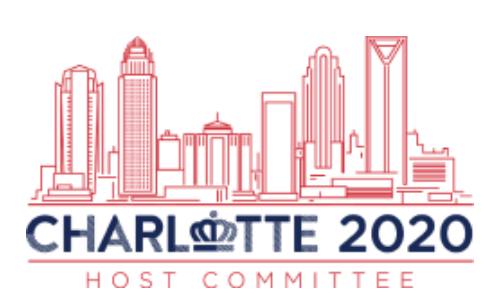 |
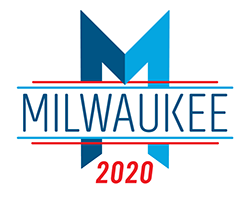 |
Recent Democratic and Republican conventions have been
designated as National Special Security Events, meaning that
the U.S. Secret Service takes the lead role in assuring the
safety and security of convention-goers. The effort is
complex and involves months of planning and dozens of
entities and agencies. For 2020 the host cities of
Charlotte and Milwaukee each were initially authorized to
receive $50 million federal grants for security (+),
but as the pandemic took hold and convention plans were
downsized, the grants were substantially reduced (1,
2
[PDFs]).
The platform outlines the party's philosophy and priorities and is prepared in advance of the convention. Truth be told, party platforms are not widely read documents, but the process of writing a platform affords the party the opportunity to publicly seek input from its various constituencies. During platform discussions some points of contention do arise, but generally any major dissension is ironed out before the platform reaches the convention. To further party unity the Biden campaign established task forces with Biden and Sanders members to work on platform recommendations (+). By contrast, Republicans punted on the platform process. In a June 10, 2020 meeting the RNC executive committee unanimously decided Republicans will stick with their 2016 platform:
"The Convention Committee on Platform will not convene
during the Rule 37(e) Convention Proceedings and the Rule
37(e) Convention will not adopt a new platform for the
Republican Party in 2020. The Rule 37(e) Convention will
adjourn with the 2016 Republican Platform continuing to
serve as the official platform of the Republican Party
until the 2024 Republican National Convention adopts a new
platform pursuant to The Rules of the Republican Party.
Any motion for the Rule 37(e) Convention to amend the 2016
Platform or to adopt a new platform, including any motion
to suspend the Procedures that will allow doing so, will
be ruled out of order."
MUCH WAS LOST
IN THE COVID-RECONFIGURED CONVENTIONS...
Interest
Groups
Interest groups work the conventions on many
different levels. Before the convention starts,
interest groups weigh in on the party platform. During
the convention, groups organize receptions, forums, caucuses
and meetings; some set up hospitality suites. Also on
hand at the convention is the opposing party, which
generally sets up a communications shop and provides daily
briefings and rapid response for reporters. With
thousands of media representatives on hand, many groups
mobilize and try to get out their messages to a broader
audience. There are ad campaigns, special events and
other creative efforts, and some groups take to the streets.
Conventions have long attracted an assortment
of demonstrators. One need only recall Chicago in
1968. Nowadays convention planners provide specially
designated protest areas near the convention halls as venues
for various groups to make their points, but these are caged
in and may not be accessible to convention attendees, so the
action has tended to occur on the streets. Most
protesters are peaceful, but there are always a few
troublemakers with destructive intentions.
Each convention city and venue poses a unique
set of challenges and creates a distinctive
atmosphere. Heading into the convention, the
soon-to-be formally nominated candidate announces his (or
her) vice presidential running mate and generally does some
kind of tour hitting key states. Delegates arrive and
activity begins. Being a delegate is an exhilarating
but exhausting experience. A successful convention
energizes attendees and activists, gets the message out to
the broader public, and sends the ticket into the fall
campaign with the convention bounce. In 2016, the
delegate experience in Philadelphia was rather different
than that in Cleveland, and not just in terms of the
tone. In Cleveland the activity was concentrated in
downtown; Philadelphia is a much larger city, and things
were more spread out, including the necessity of getting out
to the Wells Fargo Center south of downtown.
Despite the infrastructure demands and
security challenges, hosting a convention can provide a
substantial economic boost to a city.
Following the Republican Convention in
Cleveland, the Host Committee commissioned two analyses,
using different methodologies, of the convention's economic
impact on the region (+).
The Maxine Goodman Levin College of Urban Affairs at
Cleveland State University used a micro analysis based on
questionnaires completed by visitors and estimated $67.8
million in direct spending and a total economic impact of
$142.2 million in a seven-county region [PDF].
Tourism Economics used a macro analysis based on an economic
impact model and found $110.1 million in direct spending and
$188.4 million total economic impact on the region [PDF].
For the Democratic Convention, the Philadelphia
Convention and Visitors Bureau reported direct
convention-related spending of $132.9 million and total
economic impact of $230.9 million [PDF].
While the big networks have been giving less
coverage to major party conventions in recent years, they
generally have ignored third party conventions
altogether. In past C-SPAN has covered these
gatherings, which provide one of the best opportunities to
learn about ideas and viewpoints beyond those of the
Democratic and Republican parties. Due to the pandemic
all three of the major third parties cancelled in-person
meetings for selecting their nominees, although the
Libertarian Party planned an in-person component.
2020
Constitution Party National Convention
Hilton Union
Station in Saint Louis, MO - telephonically May
1-2, 2020
2020
Libertarian National Convention
JW Marriott in
Austin, TX - May 21-25, 2020 postponed
online session May 22-24, 2020
additional convention business Orlando, FL July 7-12, 2020
2020 Green
Party National Convention
Wayne State
University in Detroit, MI - July 9-12, 2020 virtual
| REPUBLICAN | DEMOCRATIC | |
| 2016 |
Cleveland,
OH July
18-21 |
Philadelphia,
PA July
25-28 |
| 2012 |
Tampa-St. Petersburg, FL Aug. 27-30 | Charlotte,
NC Sept. 4-6 |
| 2008 | Minneapolis-St. Paul, MN Sept. 1-4 | Denver, CO Aug. 25-28 |
| 2004 | New York, NY Aug. 30-Sept. 2 | Boston, MA July 26-29 |
| 2000 | Philadelphia, PA July 31-Aug. 3 | Los Angeles, CA Aug. 14-17 |
| 1996 | San Diego, CA Aug 12-15 | Chicago, IL Aug. 26-29 |
| 1992 | Houston, TX Aug. 17-20 | New York, NY July 13-16 |
| 1988 | New Orleans, LA Aug. 15-18 | Atlanta, GA July 18-21 |
| 1984 | Dallas, TX | San Francisco, CA |
| 1980 | Detroit, MI | New York, NY |
| 1976 | Kansas City, MO | New York, NY |
| 1972 | Miami Beach, FL | Miami Beach, FL |
| 1968 | Miami Beach, FL | Chicago, IL |
| 1964 | San Francisco, CA | Atlantic City, NJ |
| 1960 | Chicago, IL | Los Angeles, CA |
Note:
Through 2012 the major party conventions had been funded
in part by grants from the Presidential Election Campaign
Fund (the $3 income tax check-off). The grants, set
out in the Federal Election Campaign Act, started at $2.2
million back in 1976 and were increased a couple of times
in addition to being adjusted for cost-of-living
increases. To prepare their 2012 conventions, the
Democrats and Republicans each received grants of about
$17.7 million from the Treasury. Starting in 2016,
as a result of H.R.
2019: Gabriella Miller Kids First Research Act,
signed into law on April 3, 2014, the national party
committees no longer received federal grants to help them
put on their conventions. That left the question of
how to make up for the lost funding. On Oct. 9, 2014
the FEC, responding to an Advisory Opinion Request (AOR)
filed jointly by the DNC and RNC, ruled that the national
party committees could establish convention committees
that can raise federal funds under separate limits.
The decision was met with disfavor by campaign finance
watchdog groups (+).
Resources
2016
| 2012
|
2008
|
2004
| 2000
David Bauerlein. "City of Jacksonville expects
reimbursement for $153,000 in GOP convention planning
costs." Florida
Times Union, Oct. 16, 2020.
Jeramey Jannene. "How Much Did DNC Cost
Milwaukee?" Urban
Milwaukee, Sept. 16, 2020.
Nicholas Riccardi. "GOP Chair: We will not be
holding a virtual convention." AP,
May 18, 2020.
Reid J. Epstein. "If Democrats Hold a Big Convention, Will Anybody Come?" New York Times, May 18, 2020.
Reid J. Epstein. "Democratic Convention Planners
Look at Contingency Options." New York Times,
March 23, 2020.
Emily Glazer and John McCormick. "Coronavirus,
Early Convention Add Pressure on Democrats." Wall
Street Journal, March 22, 2020.
R. Sam Garrett and Shawn Reese. "Funding
of Presidential Nominating Conventions: An
Overview." Congressional
Research
Service, May 4, 2016.
--. Oct. 2009. NATIONAL PARTY CONVENTIONS 1831-2008.
Washington, DC: CQ
Press.
"National Party
Conventions 1831-2008 provides focused,
detailed, and wide-ranging information on national
party conventions, which have been a key element of
the U.S. electoral process since the early nineteenth
century. A comprehension of the history and evolving
structure of the conventions is essential to
understanding how presidential leaders are chosen in
the United States. This reference presents a thorough
examination of U.S. nominating conventions, including
pre-convention politics, descriptions of the
convention system, and in-depth information on
specific conventions and political parties through the
election of Barack Obama in 2008."

